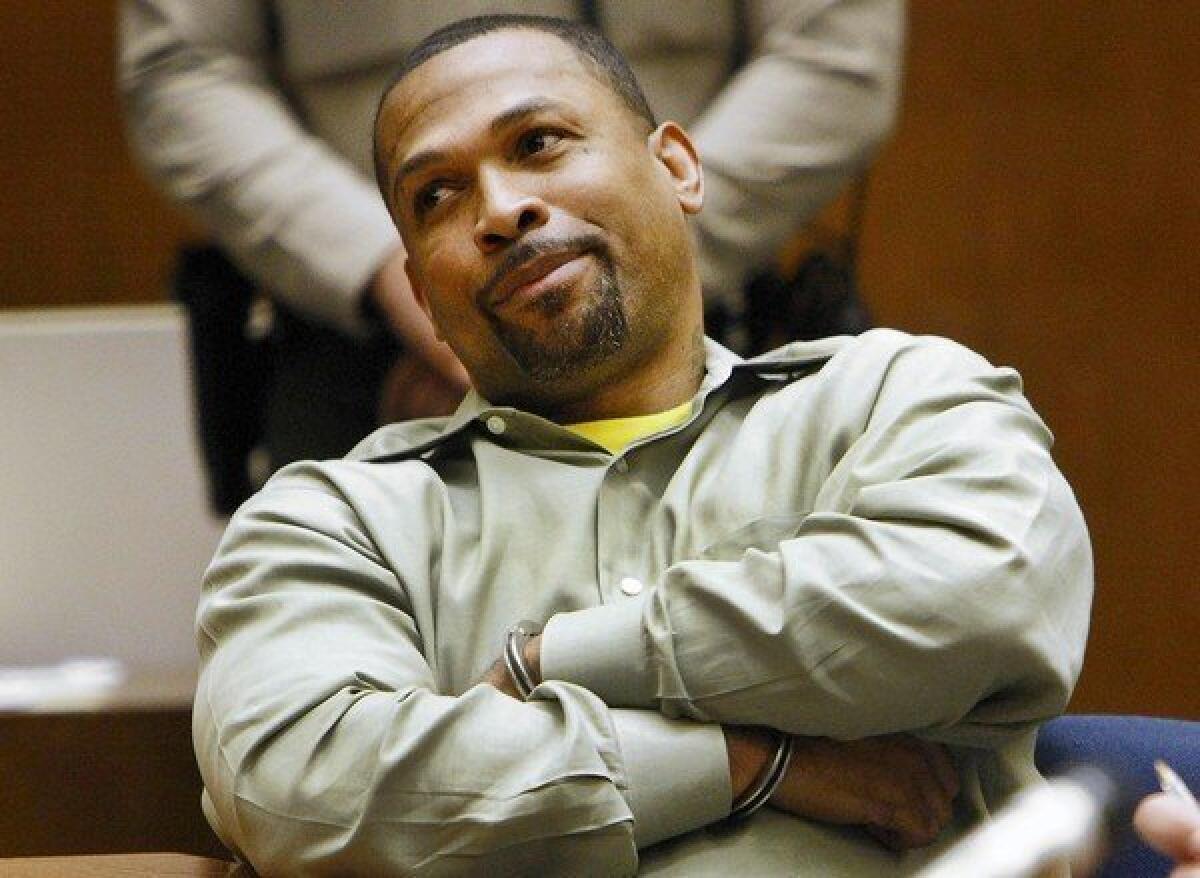Death sentence in 49th Street Massacre won’t heal grief

- Share via
They came to court on Friday hoping to put the “49th Street Massacre” behind them but knowing they never will.
Sergio Marcial Sr. stepped to a lectern in a downtown Los Angeles courtroom and spoke of the grief he has suffered since the day, more than seven years ago, his 10-year-old son and 22-year-old younger brother were gunned down by gang members wielding AK-47 rifles outside the family home.
His sister told the packed courtroom her family has “been scarred for life.” Marcial’s wife wiped away tears, saying she would never see their slain son David graduate from school or celebrate the birth of his children.
The neighborhood has never recovered, residents say, with children too afraid to play on their block of 49th Street.
Los Angeles County Superior Court Judge Stephen A. Marcus told them he could never fully comprehend their loss. He sentenced Charles Ray Smith, one of the two gunmen convicted in the attack, to death. He called Smith, 44, the mastermind of the shooting and a “ruthless killer who had no qualms about killing children.”
The sentence capped a legal saga that included multiple trials and saw Smith’s alleged accomplice also sentenced to death. The attack that killed three people and seriously wounded a 12-year-old boy in 2006 was one of the most notorious gang crimes in recent L.A. history.
The judge described the victims as innocent people unwittingly caught up in a war between two local gangs. He said the shooting still stood out for its shocking violence, even after such recent national tragedies as the mass killings last year at a movie theater in Aurora, Colo., and Sandy Hook Elementary School in Newtown, Conn.
“It was pure evil visiting the community,” Marcus said.
As Marcus spoke, Smith frequently turned to smile at relatives and friends in the audience or to shake his head in apparent disagreement with the judge.
Marcus said one of the most striking aspects of the case was Smith’s lack of remorse. “He has laughed and smiled his way through these many courtroom sessions,” the judge said at one point, “as if he was on a Friday night at a county fair.”
Smith was convicted of an additional shooting that took place on March 31, 2006, when a construction worker, 27-year-old Bani Hinojosa, was shot in the back while bringing home milk to his wife and children.
Marcus rejected a defense request to change the sentence to life in prison without the possibility of parole or to give Smith a new trial in which another jury would determine if he should be put to death.
Smith’s attorney, James Bisnow, argued that the defense was unfairly hamstrung in presenting evidence that Smith suffered from social isolation while growing up in South L.A. and that his upbringing by drug-addicted parents inevitably led him into a life of crime. Bisnow also alleged that Deputy Dist. Atty. Amy Ashvanian improperly cried during her closing argument in front of jurors earlier this year.
Ashvanian denied crying, saying her voice had quivered at one point while discussing the killing of the 10-year-old boy and she took a brief pause to sip some water before continuing. Marcus ruled that the prosecutor had shown a natural emotion and did nothing wrong.
The 49th Street shooting was one of several high-profile gang crimes that initially stoked fears among some of a possible race war. Witnesses described the gunmen as black; the victims were Latino.
But prosecutors argued that the motive for the killings had less to do with race and more with local gang rivalries. They argued that Smith and another man, Ryan T. Moore, mistook the victims for rival gang members in a tit-for-tat feud over turf, drugs and pride. Moore was convicted during a separate trial and sentenced to death.
None of the victims had any gang connections.
The judge said during Friday’s sentencing hearing that race did play a role in the murders. He described Smith as a “shotcaller,” or leader, of a predominantly black local gang that was at war with a Latino gang.
The 49th Street Massacre occurred on June 30, 2006, two weeks after rival gang members shot one of Smith’s close friends and fellow gang members. The judge noted that all the victims were innocent Latinos living in an area claimed by the rival Latino gang.
“They were murdered without warning simply because defendant Smith and co-defendant Moore wanted to kill Hispanic persons, even children, to avenge the killing” of their friend, Marcus said. “The crime scene was one of death, destruction and carnage.”
Slain on 49th Street were David Marcial, 10, who loved soccer and making people laugh and often told his parents, “You’re the bestest”; his uncle, Larry Marcial, 22, an aspiring singer who had two young children; and Luis Cervantes, a 17-year-old neighbor who hoped to become a computer technician or police officer.
David’s 12-year-old brother, Sergio Jr., was seriously wounded in the attack. The boys had been riding their bicycles in front of their house when the gunmen pulled up and opened fire.
The judge said that Smith must have known he was targeting children and cited a witness who testified that Smith told her after the shooting: “If they’re old enough to shoot, they’re old enough to get shot.”
“You’d have to be deaf, dumb and blind to mistake them for gang members,” Marcus said.
The judge urged the victims’ families to honor their loved ones by cherishing their memories and making room in “life for the other things that matter,” such as their other children and relatives.
“I know that the evil that Mr. Smith represents can’t triumph in the end,” Marcus said.
More to Read
Sign up for Essential California
The most important California stories and recommendations in your inbox every morning.
You may occasionally receive promotional content from the Los Angeles Times.











